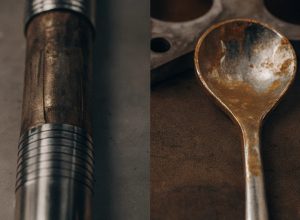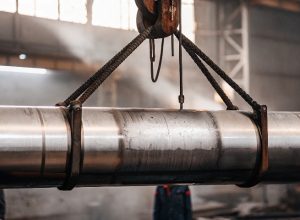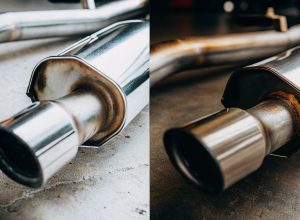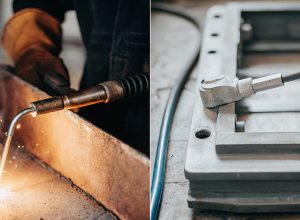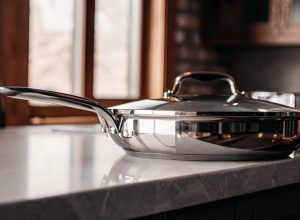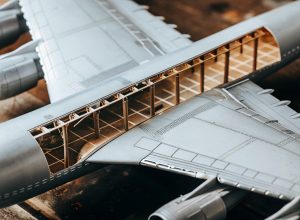Frustrated with parts failing from rust? This corrosion leads to costly replacements and downtime. Titanium offers a permanent solution, protecting your long-term investment1.
Titanium doesn’t rust like iron. It instantly forms a protective oxide layer when exposed to air. This microscopic shield stops corrosion before it starts, even in harsh environments like seawater, ensuring extreme durability and longevity for any application.
That immediate self-protection is what makes titanium so remarkable. I remember a client, Ahmed, who runs a metal distribution business in Turkey. He was skeptical at first. He stocks materials for small marine part manufacturers and couldn’t believe a metal could resist saltwater so effectively. He asked me a series of questions to really understand the science behind it. Let’s break down his questions, because they are probably the same ones you have.
Does titanium rust quickly?
Hesitant to invest in titanium, assuming all metals rust quickly? This assumption could lead you to choose weaker materials. In reality, titanium’s ‘rusting’ process is what makes it so durable.
No, titanium does not rust quickly at all. Unlike iron, which rusts destructively over time, titanium forms a stable, passive oxide layer the moment it touches air. This protective film prevents any further corrosion, making it incredibly resilient.
Let’s be very clear here: the word "rust" specifically means iron oxide. So, technically, titanium can’t rust. It oxidizes, which is a different chemical reaction. When I explained this to Ahmed, it was a real ‘aha’ moment for him. His customers in the marine industry were used to stainless steel parts showing spots of rust after just a season at sea. The key difference is the nature of the oxide layer.
The Protective Shield vs. The Destructive Flake
| Iron reacts with oxygen and water to form a flaky, red-brown layer. This layer is porous. It lets more oxygen and water reach the metal underneath, so the corrosion continues until the metal is destroyed. Titanium’s oxide layer is the complete opposite. It forms instantly and is incredibly dense and stable. It seals the metal off from the environment. If you scratch it, a new protective layer forms immediately. | Feature | Iron/Steel Rusting | Titanium Oxidation |
|---|---|---|---|
| Process Speed | Gradual and continuous | Instantaneous | |
| Layer Type | Flaky, porous, weak | Tough, non-porous, stable | |
| Result | Weakens and destroys the metal | Protects the metal from corrosion | |
| Self-Healing | No, it gets worse | Yes, it repairs itself instantly |
How quickly does titanium oxidize?
Need a material that’s protected from day one? Waiting for coatings or treatments costs time and money. Titanium bypasses this by oxidizing almost instantly, providing immediate, permanent protection.
Titanium oxidizes virtually instantly. The moment its surface is exposed to oxygen in the air or water, a thin, tough, and stable layer of titanium dioxide (TiO₂) forms. This passivation layer is what gives titanium its famous corrosion resistance.
This process is called passivation. The amazing part is the speed. We are talking about fractions of a second. The resulting titanium dioxide (TiO₂) layer is only a few nanometers thick, but it’s exceptionally tough, stable, and self-healing2. This layer is also transparent, so you don’t even see it; you just see the beautiful metallic luster of the titanium underneath.
A Distributor’s Dream
This was a huge point for Ahmed’s business in Turkey. I told him this is a major benefit for a distributor. Unlike some specialty steels that require climate-controlled warehousing or protective oils to prevent surface corrosion, titanium bar and sheet don’t need any of that. The material is already fully protected the moment it leaves my manufacturing partners in Xi’an. It can sit in his stock for months and still be in perfect condition. This reduces his overhead and gives him confidence that the material he sells to his customers is flawless. This reliability is a major selling point for his small manufacturing clients.
Does titanium tarnish fast?
Worried about a metal’s appearance degrading over time? Tarnish makes products look cheap and lowers their perceived value. Titanium resists tarnishing, keeping its finish clean for years.
No, titanium does not tarnish fast. In fact, it hardly tarnishes at all under normal conditions. Its stable, self-repairing oxide layer protects the surface from the chemical reactions that cause silver or copper to discolor, maintaining its original appearance.
"Tarnish" is just a mild form of surface corrosion that changes a metal’s color. You see it on old silver cutlery or copper pipes. It happens when the metal reacts with things in the air, most often sulfur compounds. Ahmed asked about this because some of his clients make high-end consumer products, where looks are everything.
Why Titanium Stays Bright
| The answer, once again, is that stable titanium dioxide (TiO₂) layer. This protective shield is so dense and non-reactive that it blocks the airborne chemicals that cause tarnishing. While other metals slowly discolor, titanium keeps its metallic luster. This is a huge advantage for applications where appearance is just as important as strength, like in architectural panels, jewelry, or premium electronics. For a small business making titanium watches, this means the product will look brand new for decades. That kind of longevity justifies a higher price. | Metal | Tarnish Reaction | Common Appearance |
|---|---|---|---|
| Silver | Reacts quickly with airborne sulfur | Turns dark gray or black | |
| Copper | Reacts with oxygen, water, and CO₂ | Forms a green patina (verdigris) | |
| Titanium | Extremely stable oxide layer | Remains unchanged, keeps luster |
Does natural titanium rust?
Searching for a material that is naturally rust-proof? Coatings can chip and special alloys can be costly. Natural titanium is inherently corrosion-resistant, requiring no extra protection.
No, natural titanium does not rust. Rust is specifically iron oxide, and titanium contains no iron. It develops a passive oxide film that protects it from all forms of corrosion, making it perfect for long-term use in critical applications.
This is a great final question because it gets to the heart of the matter. Natural titanium, whether it’s a commercially pure grade like Grade 2 or an alloy like Grade 5 (Ti-6Al-4V), simply does not rust. The term "rust" is exclusive to iron and steel. Titanium’s inherent chemistry makes it immune to that specific type of decay.
The Ultimate Test: The Human Body
The best proof of titanium’s non-reactive nature is its use in medical implants. When a surgeon places a titanium hip replacement or dental implant into a human body, it’s expected to last for decades. The body is a warm, wet, and salty environment—incredibly corrosive. Titanium is one of the very few metals that can survive in this environment without corroding, reacting, or leaching harmful ions. This biocompatibility3 is all thanks to that stable, passive TiO₂ layer. I assured Ahmed that this fundamental property is a constant. Whether he’s stocking Grade 2 for a client making marine heat exchangers or Grade 5 for a motorsports team, the base corrosion resistance is always the same. They are buying the inherent performance of the metal itself.
Conclusion
In summary, titanium does not rust. It instantly forms a protective oxide layer that prevents corrosion, ensuring extreme durability and a long-lasting appearance for any critical application.
-
Learn how titanium can be a smart long-term investment for businesses due to its durability and low maintenance. ↩
-
Explore the concept of self-healing materials and how titanium’s properties exemplify this feature. ↩
-
Discover the significance of biocompatibility in materials like titanium, especially in medical applications. ↩







